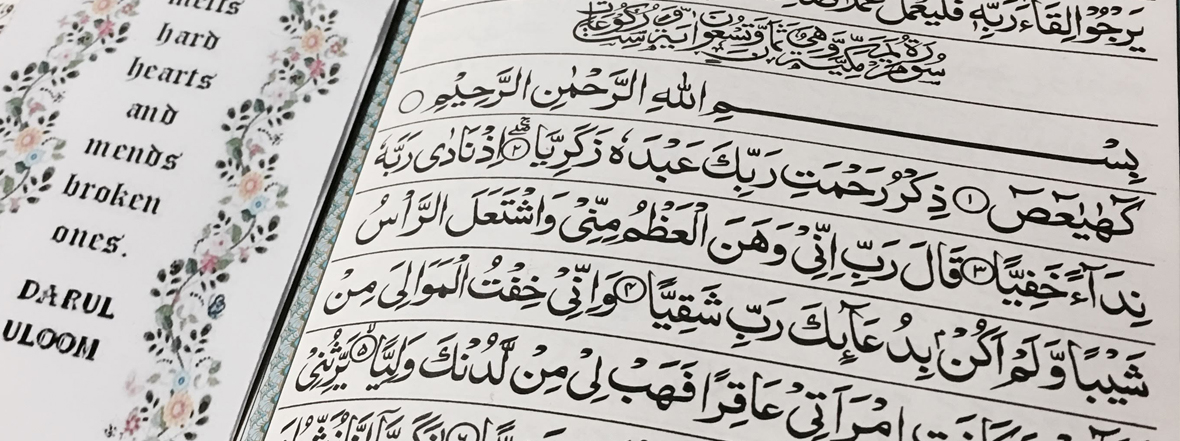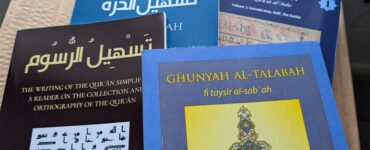Tafsir is basically trying to understand the Qur’an. Generally, most people who read the Qur’an can understand something from the Qur’an. However, there is a big difference between a person who reads a translation of the Qur’an and between person who can understand it through the Arabic language.
So, lets say you want to understand the Qur’an at a deep level what would you need to study to achieve this? So here is my list for students of knowledge like me.
I was thinking of doing a live stream on it or a YouTube tutorial on it but let me write this post and may be I can do a more detailed video.
To understand the Qur’an at a deep level there are certain obstacles that need to be over come:
1. The Arabic language is possibly the first challenge you will need to overcome to go beyond relying on someone elses translation.
For this you will need to study the following:
- Arabic Grammar
- Sarf
- Balagah
Benefits: All of these will have to be studied up to the highest level. This will allow you to understand the various expressions and correct meaning in sentence structure.
If you don’t, you will make mistakes in translating or misconstrue the meaning of verses.
2. Next you will need to learn the various genres of Arabic literature when the Qur’an was revealed.
For this you will need to study:
- Adab [Arabic Lit.]
This will give you an understanding of not only how sentences were structured in the days of the revelation of the Qur’an but also of the peak of Arabic eloquence. The Qura’n’s superiority in the Arabic language can only be appreciated when its cross referenced with other High Class Arabic writings.
The dictionaries that have been written in Arabic are much different than dictionaries in English. I do not have time here to give you a summary of how they work and their various types but trust me they are brilliant. That still does not mean that a person can suffice with a dictionary and leave out the poetry. Poetry gives meaning, context, cultural backdrop and the mindset of Arabs. This brings the words of the Qur’an to life as a living language.
If you do not: Your understanding of the Qur’an will be deficient and more or less the same as someone who learns the Qur’an through a translation.
3. There is also the need to understand the root meanings of words.
This would require a person to study:
- Al-Ishtiqaq الاشتقاق
In short these are books dictionaries of the Qur’an. They deal primarily with the meaning of each word in the Qur’an and finding where it comes from and how the Arabs use that word on a day to day basis. This opens up the precise meaning of the word so that it does not become diluted with other similar words or even.
e.g. the difference between خوف خشي تقوى
If you do not: the precise nature of the Qur’an will be lost in approximations and synonyms. Ultimately the student is deprived of grasping the nuances of using certain words in one verse and another word in other verses.
4. Knowing the themes of the Qur’an is another important aspect of Qur’an studies which gives greater depth of Qur’an.
This would require a person to study:
- Books of Tafsir / Uloom of Qur’an focuses on the thematics of the Quran
It helps in creating an overview of the topics and themes covered in the Quran. Although this can be achieved by reading the Quran regularly over a long period of time however, by studying thematics of the Quran has two benefits:
- it gives you a head start
- the links between chapters, verses and words become more and more evident.
If you do not: The Qur’an may seem very disjointed and become very difficult to see the coherence of verses.
5. There will always be many verses you won’t understand or are unsure of what it refers to especially legal rulings.
This would require a person to study:
- Certain books of tafsir depending on what you want to understand.
This brings us to the features of the various books of Tafsir. Each major Tafsir is important to a certain degree. likewise, each Tafsir reflects the expertise of the author. So you will get a Mufassir [author of tafsir] who is an expert in:
- Grammar
- Legal rulings
- Hadith
- Theology
- Spirituality
- Balagha
- Linguistics
- Opinions of scholars regarding verses
- Stories of the Quran
- Thematics
- Other areas
If you do not: Many verses will be misunderstood.
6. Finally, I would say knowing the various aspects of the Qur’an the scholars in history have dealt with is a must for any student of the Qur’an.
This would require a person to study:
- Uloom al-Qur’an / Uloom Tafsir
The student would be exposed to all the works in history done around the Qur’an such as:
- Various recitations
- Tajweed of the Qur’an
- Background of revelation of verses
- History of the Qur’an
- Compilation of the Qur’an
- Answering Questions raised against the Qur’an
There’s lots more I could have written but I just looked at the time and realised I have to go 🙂
– Mufti Liaquat Zaman






